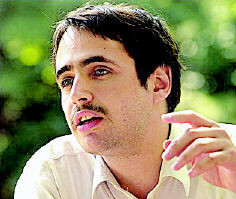hankyoreh
Links to other country sites 다른 나라 사이트 링크
[Column] Toward a diverse society

There existed a major difference in political and social discourse in Europe and Korea during the 1990s. In Europe, the word
Some 25 percent of the population of London is of non-British descent and 15 percent of the population of Hamburg is of non-German descent, so now, when masses of Asian descent stand at the center of progressive struggles, invoking the "English nation" or the "German race" in a speech naturally makes you ultra-right. Korea has of course always had racial minorities like Chinese and multiracial people. But up to the 1990s they were never noticed by a progressive movement preoccupied with minjok.
Things are different now. The government is trying to constrain labor immigration with barbaric crackdowns on undocumented workers and a policy of deportation, but immigration through marriage is rising rapidly. "Marriage immigrants" number more than 75,000, multicultural marriages account for more than 14 percent of marriages yearly, and approximately 35 percent of men in farming, forestry, and fishing are marrying foreign spouses. If the trend continues the number of children born to at least one immigrant parent will be 1.5 million in 20 years. Roughly 53 percent are earning less than what the government considers a minimum cost of living, but families with immigrants are "masses among the masses," people who endure twice the suffering in the form of poverty and discrimination. It is these people upon whom the progressive movement needs to focus preferential interest.
The government's policy towards them is both inadequate and an antimony. It says that Korea is "becoming a multicultural society," but the insufficient money it has budgeted for this is used mostly for "assimilation projects." Various agencies and organizations show off how they do "their part" to "construct a multi-cultural society" and compete to get their Korean language classes in the media. They even boast about how they are turning foreign women into "exemplary Korean daughters-in-law" through "Korean traditional cultural education" that includes putting them in traditional Korean clothes and showing them how to bow to their in-laws.
Someone who is going to spend his or her life in Korea should indeed speak Korean, and Korean language education for "marriage immigrants" is still disorganized and terribly lacking. However, in an era when minjok continues to mean less of what it used to, is there really a need to absolutely "Koreanize" others who have different cultural backgrounds? Is it really appropriate in an age of democracy and plurality to teach women from Vietnam and the Philippines, where traditionally women enjoyed higher status than in Joseon-era Korea, where neo-Confucianism was all the rage, about old customs full of patriarchal ideology, while referring to such customs with grand names such as "traditional etiquette" and "traditional culture"?
It is important that foreign women and their children are taught Korean, but it is a matter of human rights that they continue to maintain their cultures and languages. Their children are Korean citizens, but they also have the right to culturally and linguistically be Vietnamese and Filipinos. If Korea really wants to be a society of diversity, we need to systematically guarantee their cultural and linguistic individuality in the way that is done in Scandinavia, where areas where there are a high number of children of immigrants also learn their native languages at school and at least some of their academic classes are taught in those languages.
The validity of the concept of minjok, first accepted a century ago, has expired. The Korea of the future will not be monopolized by the Korean minjok Instead it will be a place where there is a diverse mixture and meeting of culture and language. If Korea is going to move smoothly towards being a "rainbow society," we need to simultaneously get rid of the idea we are going to make everyone 'the same' and instead give them the opportunity to acclimate to Korean society while able to maintain their individuality.
Editorial・opinion
![[Guest essay] Preventing Korean Peninsula from becoming front line of new cold war [Guest essay] Preventing Korean Peninsula from becoming front line of new cold war](https://flexible.img.hani.co.kr/flexible/normal/500/300/imgdb/original/2024/0507/7217150679227807.jpg) [Guest essay] Preventing Korean Peninsula from becoming front line of new cold war
[Guest essay] Preventing Korean Peninsula from becoming front line of new cold war![[Column] The state is back — but is it in business? [Column] The state is back — but is it in business?](https://flexible.img.hani.co.kr/flexible/normal/500/300/imgdb/original/2024/0506/8217149564092725.jpg) [Column] The state is back — but is it in business?
[Column] The state is back — but is it in business?- [Column] Life on our Trisolaris
- [Editorial] Penalties for airing allegations against Korea’s first lady endanger free press
- [Editorial] Yoon must halt procurement of SM-3 interceptor missiles
- [Guest essay] Maybe Korea’s rapid population decline is an opportunity, not a crisis
- [Column] Can Yoon steer diplomacy with Russia, China back on track?
- [Column] Season 2 of special prosecutor probe may be coming to Korea soon
- [Column] Park Geun-hye déjà vu in Yoon Suk-yeol
- [Editorial] New weight of N. Korea’s nuclear threats makes dialogue all the more urgent
Most viewed articles
- 1Behind-the-times gender change regulations leave trans Koreans in the lurch
- 2Family that exposed military cover-up of loved one’s death reflect on Marine’s death
- 3Yoon’s revival of civil affairs senior secretary criticized as shield against judicial scrutiny
- 4South Korean ambassador attends Putin’s inauguration as US and others boycott
- 5Marines who survived flood that killed colleague urge president to OK special counsel probe
- 6‘Weddingflation’ breaks the bank for Korean couples-to-be
- 7Yoon’s broken-compass diplomacy is steering Korea into serving US, Japanese interests
- 8Hybe-Ador dispute shines light on pervasive issues behind K-pop’s tidy facade
- 9Lee Jung-jae of “Squid Game” named on A100 list of most influential Asian Pacific leaders
- 10[Guest essay] Preventing Korean Peninsula from becoming front line of new cold war